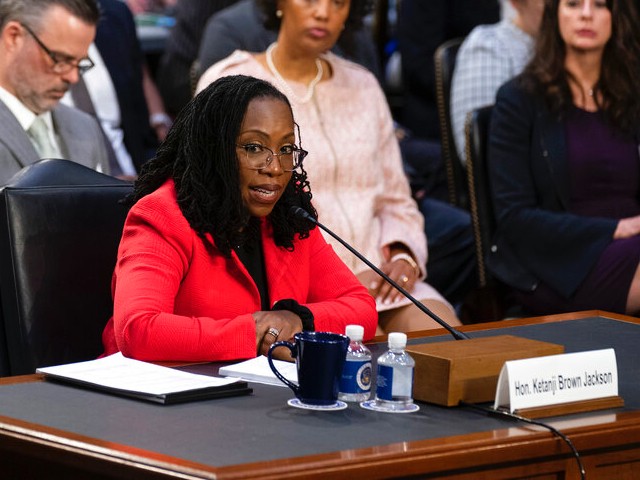Democrat Sen. Dick Durbin (D-IL) leaped to the defense of President Joe Biden’s Supreme Court nominee on the second day of her confirmation hearing, favorably questioning her record of “lenient” sentences for defendants who were caught in possession of child pornography.
Durbin, who is the Chair of the Senate Judiciary Committee, started off the hearing by raising questions about Ketanji Brown Jackson’s record of sentencing “non-production” cases below federal guidelines — a line of questioning which was in direct response to Sen. Josh Hawley’s (R-MO) Twitter thread last week. In these tweets, Hawley detailed Jackson’s rulings, interviews, articles, and speeches and accused her of “having a pattern of letting child porn offenders off the hook for their appalling crimes.”
Durbin’s first sympathetically queried about how Jackson’s family must have felt hearing Hawley’s accusations before asking her to comment on her judgment in the many cases Hawley detailed in his tweets.
“I thought about his charges as I watched you and your family listening carefully yesterday, and what impact it might’ve had on you personally to know that your daughters, husband, parents, family, and friends were hearing the charges that your implementation of this law, sentencing, endangered children,” Durbin said. “Could you tell us what was going through your mind at that point?”
Jackson maintained that “as a mother and a judge” who has had to rule in those types of cases, she thought that “nothing could be further from the truth.” The nominee offered a lengthy and at times visibly emotional explanation for why she sentenced “non-production” sex offenders below recommended federal sentencing guidelines, a trend which has been increasing among judges, according to a 2021 report from the United States Sentencing Commission.
“The statute [set by Congress] doesn’t say ‘impose the highest possible penalty for this sickening and egregious crime.’ The statute says ‘calculate the guidelines, but also look at various aspects of this offense and impose a sentence that is sufficient but not greater than necessary to promote the purposes of punishment,”‘ Jackson explained.
Upon further prompting from Durbin, who cited fact-checks from corporate media and the National Review as supposed proof that Hawley’s claims are “unfair,” Jackson explained that the original statutory scheme for sentencing these types of sex offenders was created at a time when “more serious child pornography offenders” were judged based on the “number of photographs that they received in the mail.” She added that she believes the guidelines “made total sense before when we didn’t have internet.”

Supreme Court nominee Ketanji Brown Jackson speaks during her confirmation hearing before the Senate Judiciary Committee, Tuesday, March 22, 2022, in Washington. (AP Photo/Evan Vucci)
“But the way that the guideline is now structured based on that set of circumstances is leading to extreme disparities in the system because it’s so easy for people to get volumes of this kind of material now by computers,” she said. “It’s not doing the work of differentiating who is a more serious offender in the way that it used to. So, the commission has taken that into account, and perhaps more importantly, courts are adjusting their sentences in order to account for the changed circumstances — but it says nothing about the court’s view of the seriousness of this offense.”
Jackson also said that as a judge, when dealing with these kinds of cases, it was “important to [her] to make sure that the children’s perspectives — children’s voices are represented” in her sentences.
“And what that means, is that for every defendant who comes before me, and who suggests — as they often do — that they’re just a looker, that these crimes don’t really matter, that they’ve collected these things on the internet and it’s fine — I tell them about the victims’ statements that have come into me as a judge,” she said. “I tell them about the adults who were former child sex abuse victims who tell me that they will never have a normal adult relationship because of this abuse. I tell them about the ones who said, ‘I went into prostitution.’ ‘I fell into drugs because I was trying to suppress the hurt that was done to me as an infant.’”
“…I say to them that there’s only a market for this kind of material because there are lookers. That you are contributing to child sex abuse. And then I impose a significant sentence and all of the additional restraints that are available in the law,” she continued.
Hawley’s Twitter thread included several examples of Jackson’s various child porn possession rulings. In one of the cases, United States v. Hawkins, the defendant reportedly “had multiple images of child porn” and was over 18 years old when Jackson sentenced him to three months in prison instead of a sentence of up to ten years, per the Sentencing Guidelines.
“In United States v. Stewart, the criminal possessed thousands of images of child porn and also hoped to travel across state lines to abuse a 9-year-old girl,” Hawley wrote of another case. “The Guidelines called for a sentence of 97-121 months. Judge Jackson sentenced the criminal to just 57 months.”
“In United States v. Sears, the sex offender distributed more than 102 child porn videos. He also sent lewd pictures of his own 10-year-old daughter. The Guidelines recommended 97-121 months in prison. Judge Jackson gave him 71 months,” he continued.
In addition to detailing several other cases, Hawley wrote that Jackson has a “disturbing record for any judge…”
“…But especially one nominated to the highest court in the land. Protecting the most vulnerable shouldn’t be up for debate. Sending child predators to jail shouldn’t be controversial,” he said.
Hawley was scheduled to question Jackson much later in the hearing, which gave Durbin the chance to question Jackson before Republican members of the committee.
Katherine Hamilton is a political reporter for Breitbart News. You can follow her on Twitter.
COMMENTS
Please let us know if you're having issues with commenting.